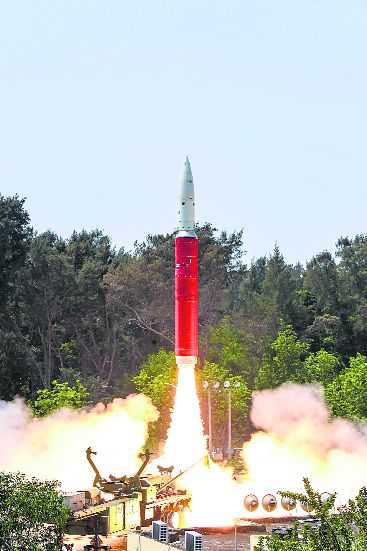Enemy can go ‘deaf, blind’
The Tribune
Ajay Banerjee
March 27, 2019
Enemy can go ‘deaf,
blind’
ASAT test provides
ability to target surveillance satellites
Satellite shot down,
PM hails India’s arrival as ‘space power’
Govt has shown
courage for surgical strikes on land, in sky and space: Modi
India’s
Anti-Satellite (ASAT) test conducted and declared on Wednesday now provides the
ability to render an enemy country ‘deaf and blind’ by targeting communication,
military and surveillance satellites.
In case satellites
are destroyed, it would be near impossible for the enemy to fire long-range
missiles and UAVs; and even its routine communication can be stalled.
The significance of
Wednesday’s ASAT test is that India has successfully demonstrated its
capability to interdict and intercept a satellite in outer space based on
complete indigenous technology. The test was done using a ground-fired
ballistic missile defence system to hit at an Indian satellite. The test does
not violate any existing international treaties and is not directed at any
country.
The China angle
China has conducted
three such tests since 2007, the latest being in February 2018. India despite
being a ‘missile power’ and space power was reticent. The US Department of
Defence, in its annual report to the Congress ‘Military and Security
Developments Involving the People’s Republic of China 2018’, says, “China is
developing multiple counter-space capabilities to degrade and deny adversary
use of space-based assets during a crisis or conflict.”
The People’s
Liberation Army (PLA) is acquiring a range of technologies to improve China’s
counter-space capabilities. In addition to the development of directed energy
weapons and satellite jammers, China is also developing direct-ascent and
co-orbital kinetic kill capabilities and has probably made progress on the
anti-satellite missile system it tested, the US report said.
India will be an
insider now
Former DRDO chairman
VK Saraswat had claimed in 2012 that India had ASAT capability. In October
2014–just five months into his tenure--Prime Minister Narendra Modi had advised
top Indian military commanders about the criticality of controlling activities
in space.
Addressing commanders
of the three armed services, Modi had said: “Control of space may become as
critical as that of land, air and sea.” As full-scale wars might become rare,
force would remain an instrument of deterrence and influencing behaviour, and
the duration of conflicts would be shorter,” Modi had said.
Time was running out
for India to declare itself as an ASAT power to join the US, Russia and China.
The United Nations Conference on Disarmament is discussing a new treaty banning
militarisation of space. Once the treaty is done and had India not carried out
the ASAT test it would put New Delhi at a serious disadvantage, as it would
then only be able to negotiate on such a new treaty as an “outsider” rather
than an “insider” with ASAT capability.
Types of ASAT options
A way to demonstrate
the ASAT capability without causing debris would be to do a fly-by test, where
the ground-based direct ascent missile will fly by the targeted satellite
without destroying it. The other option is by jamming satellites using
space-based lasers. This method falls under the category of “soft-kill” methods
and does not create debris.
Status of banning
ASAT
The ‘Treaty on
Prevention of the Placement of Weapons in Outer Space and of the Threat or Use
of Force Against Outer Space Objects’ and generally referred to as ‘PPWT’ is
still being discussed. China and Russia had submitted an update to their
original 2008 proposal in June. The US has objected to the lack of a
verification mechanism and no restrictions on the development and stockpiling
of ASAT weapons on the ground. That means, a nation could develop a readily
deployable space-based weapons break-out capability.
The PPWT bans the
placement of weapons in outer space; it does not ban “direct-ascent” ASATs
launched from the ground. India used the same ground-to-space weapon.
Beijing guarded in
its reaction
Beijing: China on
Wednesday reacted guardedly to India’s anti-satellite missile test and
expressed hope that all countries will uphold peace and tranquillity in the
outer space. The Chinese Foreign Ministry, in a written response, said: “We
have noticed reports and hope that each country will uphold peace and
tranquillity in outer space.” PTI
Don’t militarise
outer space: Pak
Islamabad: Pakistan
said on Wednesday that it was against militarisation of outer space and took a
swipe at India's announcement of shooting down a live satellite with a missile.
“Space is the common heritage of mankind and every nation has the
responsibility to avoid actions which can lead to the militarisation of this
arena," Foreign Office spokesperson said.
A Ballistic Missile
Defence (BMD) Interceptor missile being launched by DRDO from Abdul Kalam
Island, Odisha. PTI

Comments
Post a Comment